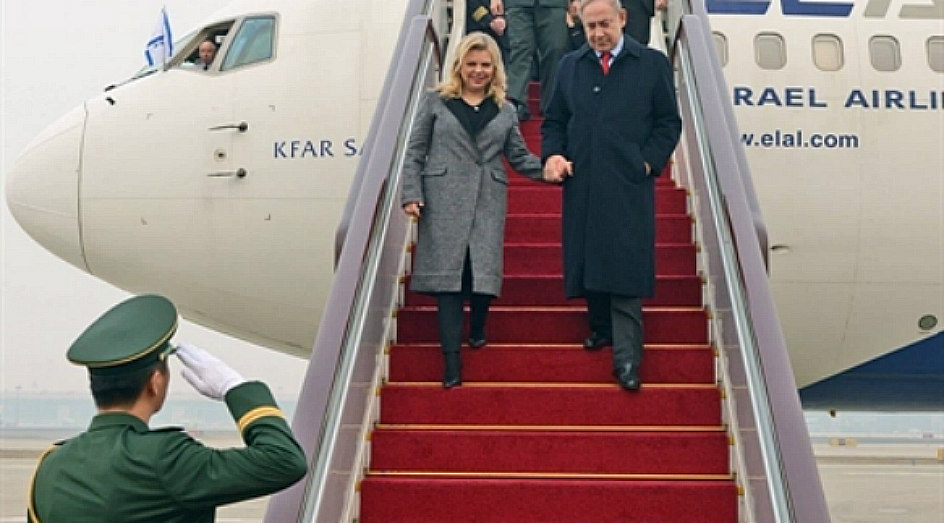How Start-Up Diplomacy has elevated Israel’s international standing

While critics in Israel have been warning that Israel is increasingly isolating itself because of the government’s policies, Prime Minister Benjamin Netanyahu has quietly been strengthening and deepening Israel’s relations worldwide, including countries that used to be off limits to the Jewish state. The Prime Minister’s historic trip to Latin America marked the first visit of a sitting Israeli Prime Minister to Argentina, Colombia and Mexico. With this visit, Netanyahu completed a tour of all the populated continents in the last 8 months.
To understand the full implications of this, one has to recall that Israel was, to varying degrees until recently, a pariah state among the nations. How has this changed and why is Israel suddenly being pursued by countries that just a few years ago would have nothing to do with it?
From its inception, the reborn Jewish state, surrounded by numerically superior enemies, quickly realized that its future depended on quality technology and building alliances worldwide.
Whereas Israel has long been a success concerning technology, its diplomatic history has been marred by disappointments and failures. Israel repelled Arab aggression in the military battlefields, but Arab propaganda has dominated the political battlefields since Israel’s spectacular military victory in 1967. Although the Yom Kippur War in 1973 ended with Israeli forces arriving within reach of Cairo and Damascus, Arab political warfare and extortion succeeded in pushing numerous countries to cut ties with Israel and further isolate the Jewish state.
Hasbara, Israel’s diplomatic effort, has focused excessively on explaining Israel’s predicament to the world through an altruistic lens. For years, Israeli diplomacy failed to internalize that nations are mainly driven by interests. Nowhere else has this been more vividly displayed than at the United Nations. While anti-Semitism never stopped rearing its ugly head, many of the countries that have traditionally voted against Israel in international forums were mainly driven by national interests. Countries like China and India did not support the infamous UN resolution equating Zionism with racism in 1975 because they shared the Arab-Soviet anti-Semitic ideology. China and India went along because they believed that the Arab world had more to offer than a tiny embattled Jewish state.
Three main factors released Israel from its former diplomatic isolation: the end of the Cold War, waning Arab influence and the emergence of the Jewish state as a global technological powerhouse.
Today, Israel’s bilateral trade and technological ties with China and India are thriving. Jerusalem has become one of India’s main military technology suppliers. Earlier this summer, India’s leader Narendra Modi became the first Indian Prime Minister to visit Israel and he invited Prime Minister Netanyahu to visit India later this year. Asia is quickly replacing the EU as Israel’s main future trading partner.
While demand for Arab oil is not ending anytime soon, more and more countries realize that certain technologies and expertise can only be acquired from Israel. The natural gas reservoirs discovered off Israel’s coast in 2009, have further eroded Arab influence and enhanced Israel’s position in the Mediterranean basin and in Europe.
Prime Minister Benjamin Netanyahu’s many recent travels worldwide underscore Israel’s dramatic transformation in the world of diplomacy, since the end of the Cold War. In 1975, Argentina and Colombia abstained, while Mexico voted in favor of the Arab-Soviet “Zionism is racism” resolution. Today, all three countries are receiving a sitting Israeli Prime Minister and are interested in benefiting from strong economic and technological ties with Israel.
After the Yom Kippur War, numerous African countries cut ties with Jerusalem. Today, Israel has diplomatic relations with most African states. Prime Minister Netanyahu was the first sitting Israeli Prime Minister to visit Uganda, Kenya, Rwanda, Ethiopia and Liberia. Netanyahu also became the first sitting Israeli Prime Minister to visit the Muslim countries Kazakhstan and Azerbaijan, which have both expressed interest in economic and technological cooperation with Israel.
In July 2017, Prime Minister Netanyahu became the first sitting Israeli Prime Minister to visit Budapest, where Zionist leader Theodor Herzl was born. Netanyahu attended a meeting of the Visegrad Group, which consists of the former Communist countries Hungary, Poland, Czech Republic and Slovakia, which all used to bow to Moscow’s anti-Zionist line. Today these Central European countries are interested in benefiting from Israel’s technological expertise and share Jerusalem’s skepticism towards Brussels.
Post-Communist Russia may not be Israel’s ally but it is no longer the implacable foe it was during the Cold War. Russian President Vladimir Putin clearly sees the Middle East through a different lens than Washington and Jerusalem do. However, the numerous meetings between Netanyahu and Putin stem from Russia’s recognition that Israel’s military power and vital interests cannot be ignored.
In the Middle East region, Israel enjoys diplomatic ties with Turkey, Egypt and Jordan. The Jewish state is also secretly cultivating tacit commercial and political ties with several Sunni Arab Gulf States that are interested in Israeli technologies and share Jerusalem’s concern about Iran’s expansionist ambitions.
Israel has established an enviable reputation as the Start-Up nation and has become a technological role model for many countries around the world. The Jewish state is uniquely positioned to transform itself into the Start-up diplomacy nation by forging alliances through its vast technological capabilities.
More than any of his predecessors, Prime Minister Benjamin Netanyahu has recognized Israel’s untapped potential to build unprecedented relations worldwide by merging technology and commerce with diplomacy. Israel’s transformation from a fragile state fighting for her existence into a robust technological powerhouse has not gone unnoticed and constitutes a source of inspiration for many countries worldwide. For the first time since its rebirth, the Jewish state has the capabilities and opportunities to assume a secure and respectable place among the family of nations.
Daniel Krygier is a writer and political analyst. He lives in Israel.



